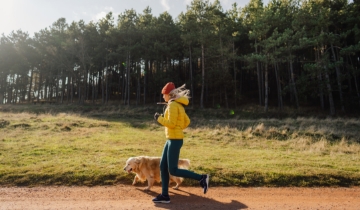Eight conditions to watch out for
Like us, cats and dogs are more likely to get sick in the winter months.
Each winter we see an increase in pet insurance claims for illnesses (and sometimes accidents) related to the colder and wetter weather. These include joint problems, and fireplace injuries.
As pet parents, it’s essential we’re aware of common winter illnesses that can affect our beloved pets and understand how to prevent them. ‘Paws’ for thought as winter bites. Here are eight common winter pet conditions and illnesses, and tips on how to prevent them:
Bladder problems
Reduced water intake and less frequent urination can lead to the formation of crystals or stones.
Cats can get stress cystitis if they are reluctant to toilet outside in bad weather and male cats are more likely to get blocked bladders when they can't urinate.
“We often notice this when a southerly weather pattern suddenly hits - cats get stressed and hesitate to go outside,” says Sally Cory, Head of Veterinary Services (Companion Animal) at the NZ Veterinary Association.
Signs and symptoms include:
- Frequent urination
- Urinating in unusual places
- Appearing pained when urinating
- Excessive licking
- Bloody urine
If your pet displays these signs, contact your vet immediately.
Prevention:
- Ensure your pet has access to plenty of fresh, room-temperature water to encourage hydration
- Provide an indoor or sheltered litter box - make sure the litter box is in a quiet place, away from family hustle and bustle, contains a suitable depth of litter, is regularly cleaned and don't expect household cats to share a litter box
- Take your dog outside for regular ‘bathroom breaks’ so that it becomes a habit
There can be significant costs relating to the management of bladder-related problems, Between July 2023 and June 2024, we paid out nearly $1.4m claims for urogenital conditions.
Heat-related injuries
When cold weather bites, people, cats and dogs will seek out the warmth of fireplaces, space heaters and other heat sources. Make sure your pet doesn’t snuggle up too close to heaters, or for too long! Heat-related injuries like burns can and do happen to pets as well as people.
Consider putting a sturdy screen or gate around fireplaces and log burners to keep your pet at least one metre away from flames and the intense heat these can give out. Never leave your pet unattended near naked flames (including candles).
Keep space heaters out of reach where they can’t be knocked, pulled over or have curious paws inserted into them.
Winter weight gain
Chilly weather and shorter daylight hours mean we are all – pets included – less inclined to spend time outdoors exercising. As a result, cats and dogs are more likely to put on weight during winter.
Health and wellness issues associated with obesity include diabetes, cardiac and respiratory problems, joint problems and even higher rates of cancer.
Prevention:
- If your pet doesn’t mind the cold weather, keep up their regular outdoor exercise time. Alternatively, play indoor games with your pet (like tag and tug-of-war) to keep them mentally and physically stimulated.
- Talk to your veterinarian about the appropriate diet and portion sizes for your pet, taking their current activity levels into account.
Pancreatitis
During the colder months, many of us enjoy tucking into comfort food and winter warmers. But giving your pet leftovers or off-cuts from your meal can cause serious health conditions. Fatty and salty foods, like the leftovers from a roast dinner, can be particularly problematic, causing conditions like pancreatitis.
The symptoms of pancreatitis include:
- Vomiting
- Diarrhoea
- Fever
- Bloating
- Dehydration
- Loss of appetite
- Lethargy
Pancreatitis is a serious condition requiring urgent veterinary treatment.
Don’t feed your pet fatty foods and make sure you keep leftovers (and other tempting ‘treats’) out of your pet’s reach. For more information on human foods not safe for the fur family, make sure to check out Paws Off!.
Dermatitis
Winter walks with your furry friend are a great way to keep you both active but winter weather can be harsh on your pet’s skin. Cold air and moisture from rain or snow can cause dermatitis (skin inflammation), dry and itchy skin, flaky skin, hair loss and even painful sores. Exposure to chemicals used to de-ice roads and pavements can also irritate your pet’s skin and paws.
Prevention:
- After playing or walking outside, make sure your pooch is completely dry
- Use pet-safe booties, or wipe their paws after they’ve been outside
- Talk to your veterinarian about pet-safe skin moisturisers, shampoos or supplements which can help keep your pet’s skin in tip-top condition during the colder months
Aches and pains
Colder temperatures can aggravate health problems for older pets. Just like us, cold damp weather doesn’t make for happy joints especially if your pet pal suffers from joint disease or osteoarthritis — the most common form of arthritis in dogs.
Arthritic joints lose cartilage, the joint capsule thickens and there may even be new bone growth occurring around the joint. It all makes moving more difficult for our aging pets, especially when the winter chill bites.
Sally Cory agrees. “We always encourage clients to be proactive with their older, arthritic pets to ensure that they are on top of things and have a plan before the colder weather hits.”
Road Traffic Accidents (RTA)
Being nocturnal, cats are often out at night, but winter brings extra dangers.
Cold, windy wet roads reflect streetlamps and headlights more than summer’s drier roads do. Cats can get disoriented in these conditions and wander onto a road they’d normally take more care on.
At the same time, winter conditions may result in reduced visibility for drivers who can’t see a cat on the road in time to avoid an accident. That could be why vets often see a spike in cat-related road traffic accidents in winter and advise keeping cats inside on wet, wintry nights.
Dogs, too, can be vulnerable in darker winter weather. Wearing a hi vis coat when they’re out walking day or night can help them be seen and safe.
Antifreeze poisoning
Cold temperatures affect our cars, too. So many people add antifreeze (which contains ethylene glycol) to protect car radiators from frosty conditions.
But most of us don’t realise how dangerous sweet-tasting ethylene glycol is for cats and dogs. Most antifreeze accidents occur when there’s a spill on the driveway or garage floor and our pets lap it up.
Ethylene glycol can cause rapid kidney failure in cats and dogs and needs to be treated quickly. Early warning signs can include vomiting, a lack of energy and loss of appetite, dehydration and drooling.
Winter tips for senior pets:
- Beware of wet, icy and slippery surfaces, particularly if your older cat or dog is unsteady on their paws.
- Ensure your pet has somewhere warm and comfortable to curl up in. The ideal pet bed is raised slightly, away from cold drafts.
- Wrap them up! A good-fitting jacket is a great way to keep your dog warm on winter walks. Consider shortening the length of winter walks and activities and don’t go out in bad weather – play at home instead.
Winter is a great time for cuddling up with your furry bestie and for exploring the different smells, sounds and sights the change in season brings. By being vigilant about common winter ailments and knowing how to prevent them, you can keep your pet safe, happy and healthy this winter.
References
Cats Matter: Cats and Roads, Winter care
https://www.catsmatter.org/single-post/cats-and-roads-winter-care
MSD Vet Manual: Ethylene Glycol (Antifreeze) Poisoning
https://www.msdvetmanual.com/special-pet-topics/poisoning/ethylene-glycol-antifreeze-poisoning



